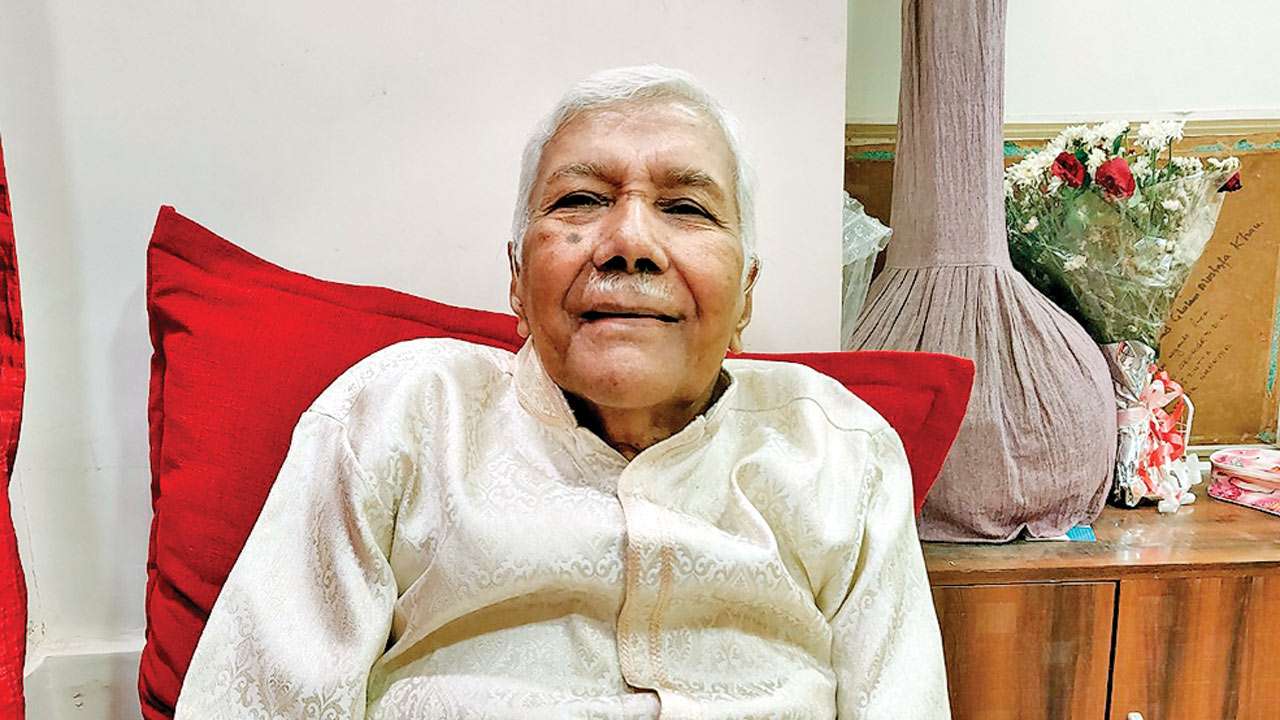
The brightly lit room in Bandra's tony Carter Road neighbourhood is done in cream and maroon. On the wall, citations for the three top Padma awards jostle for space with Sangeet Natak Akademi awards among others and photographs of Presidents Giani Zail Singh, R Venkataraman, APJ Abdul Kalam and Ram Nath Kovind with the illustrious man we are meeting.
The almost-nonagenarian Ustad Ghulam Mustafa Khan saab smiles humbly as he walks in, in a pearl white sherwani. We ask about the awards, particularly how some have come after several rank juniors but he brushes it off. "Isn't it enough you feel bad about this slight? I feel honoured people think of me so fondly," he says and adds, "Nothing can happen without divine intervention. Maybe Allah wanted me to have this now."
His biography A Dream I Lived Alone (co-written with his daughter-in-law Namrata Gupta-Khan) released in the run-up to his 88th birthday celebrations. Refering to this biography, he says, "I'm often asked about my achievements but I want people to also know the struggle and suffering that went into bringing me here."
Daughter-in-law Namrata intervenes to point out how he helped her decode family customs, culture and traditions after her inter-religious marriage with his third-son, disciple and well-known singer Rabbani in 2012. "He'd sporadically talk about his own journey, recounting anecdotes from childhood, his performances and the syncretism he grew up with. I'd be gobsmacked! Here was someone who'd lived what many wouldn't dream of. I wrote all the stuff he said. Later, when I asked help to join the dots for the book, he tried to brush off the idea. But my perseverance saw him give in."
The maestro is the great-grandson of Ustad Qutubuddin Khan a celebrated beenkar, a dhrupad and khayal exponent and the royal musician at Awadh Nawab Wajid Ali Shah's court, and the son of Ustad Waris Hussan Khan. From his mother's side, he is also the grandson of Ustad Inayat Hussain Khan. No wonder then that both his parents wanted him to focus on music. "I'd often try and skip riyaz but my mother, despite her love for me, unfailingly told Abba [father] and it earned me a thrashing."
This rigour saw him perform when only eight at Badaiyun's Victoria Gardens for Janmashtami. celebrations. "It was in the Ganga-Jamuni tehzeeb, the most beautiful elements of both religions came together. So much of what we sing borrows from both cultures and religions," he says. "Our illustrious Rampur-Sahaswan gharana was especially known for such syncretism."
Apart from training in dhrupad and khayal, he also trained in light and semi-classical forms like thumri, dadra, kajri, geet, ghazal and bhajans. The legend explains, "My gurus instilled in me that music was a book, and every form, a chapter. This non-hierarchical approach helped me become open-minded," and recounts singing for four to five hours at a stretch without food or water. "In the afternoons when the hot summer winds forced everyone indoors I'd rush off to a local graveyard to practice." A friend had fashioned a bamboo tanpura for him which kept in a freshly dug grave. "I'd pull it out, sit at a tombstone and be lost in music for long hours."
While his association with film music as both singer and composer has been long, not many know that his first song was for a Marathi film and that he has also sung several Gujarati film songs. He sang for Mrinal Sen's Bhuvan Shome and followed it with several others including the multiple national awardee Umrao Jaan (1981).
Apart from world concerts, he has also mentored several greats. Poet-lyricist Javed Akhtar says, "Every leading artiste, who has the most fans, is a fan of Ustad Ghulam Mustafa Khan [From the classically-sound Manna Dey to nightingale Lata Mangeshkar herself]."
"She'd [Lata] sought help for discomfort while singing. I made her sing a few lines from Raina Beet Jaye, diagnosed the problem and suggested she practice Raga Bhairav in C sharp. It helped," the Ustad remembers.
Others who have been shaped by the maestro's capable hands include Hariharan and veteran actor Waheeda Rehman. "She came back after the demise of her husband and asked to re-start. I agreed."
Sonu Nigam, Shaan and even A R Rahman are among his shagirds. In fact the Oscar-awardee Madras Mozart has collaborated with the legend his four sons and grandson to create two Coke studio numbers based on traditional bandishes.
"I'm happy to see not only my sons but also grandsons take my legacy forward," he beams as we take leave.